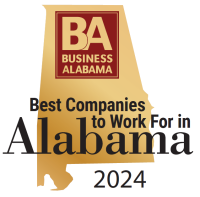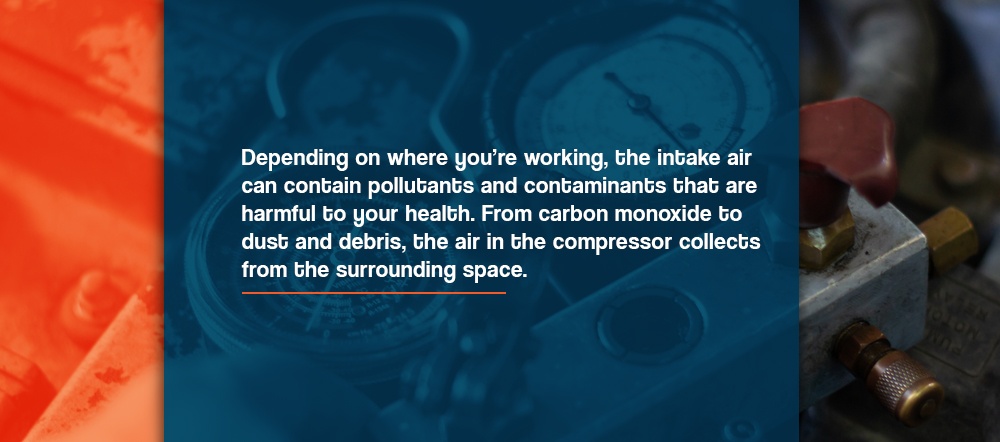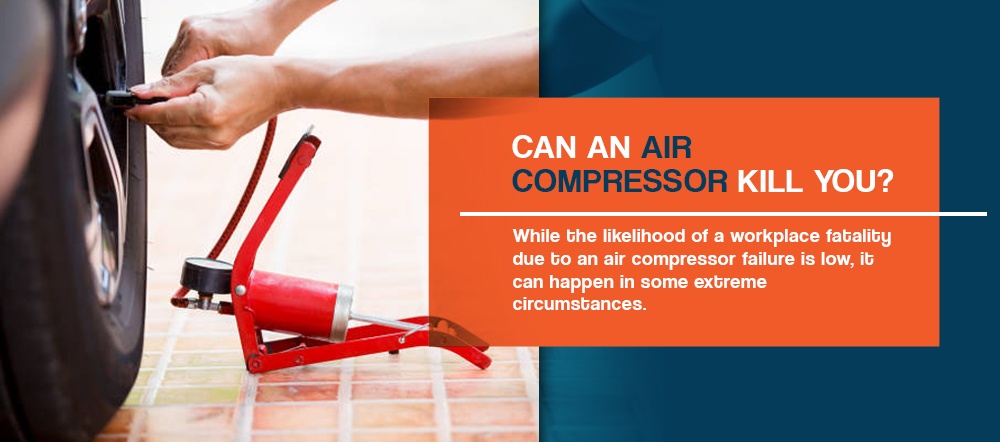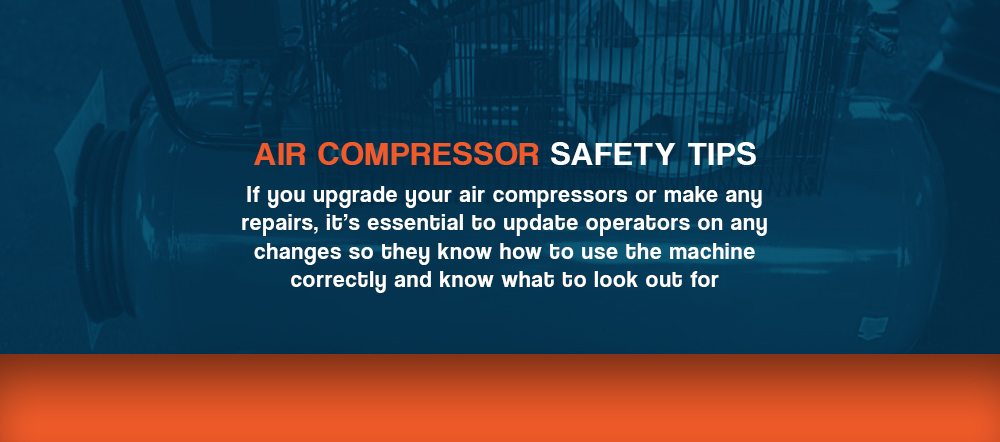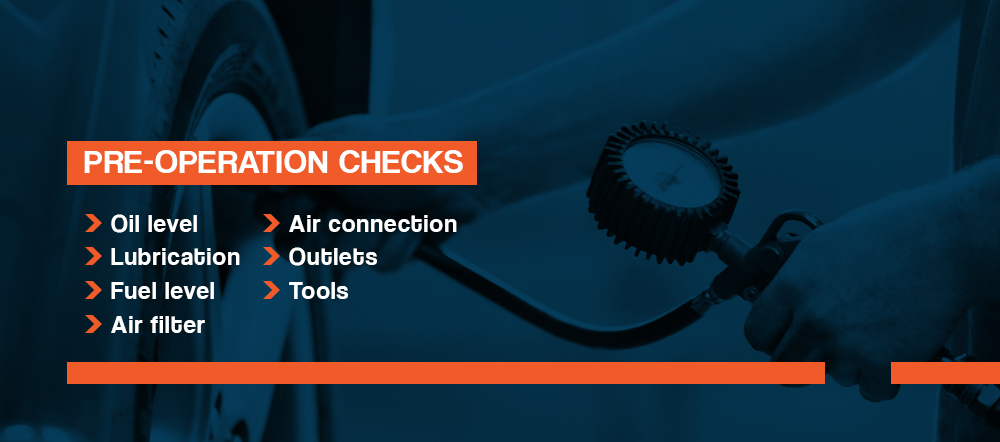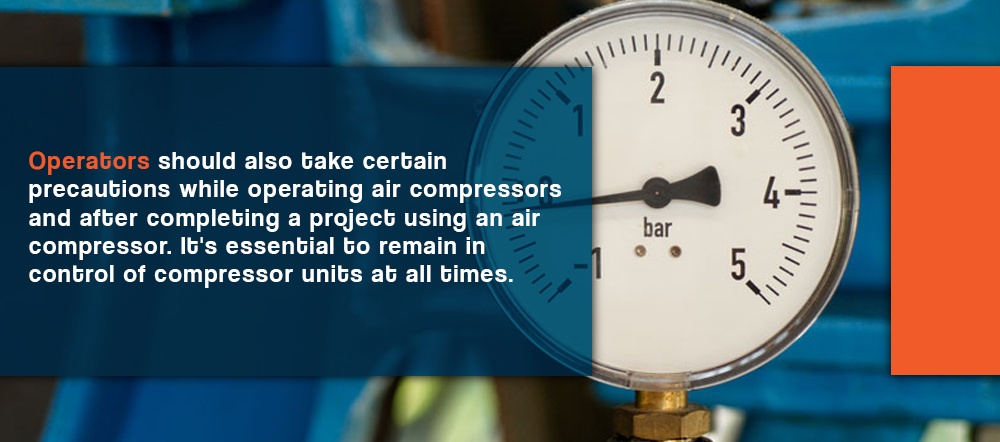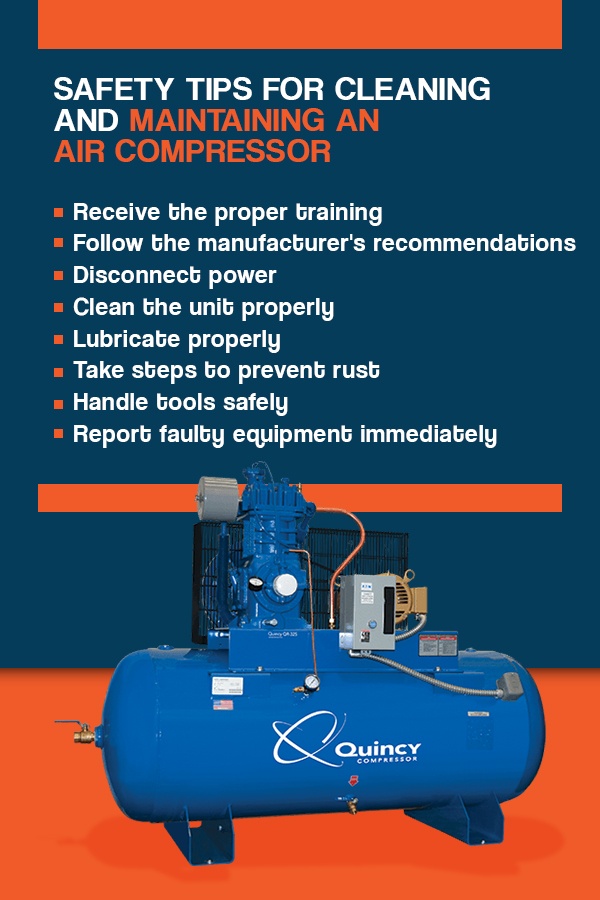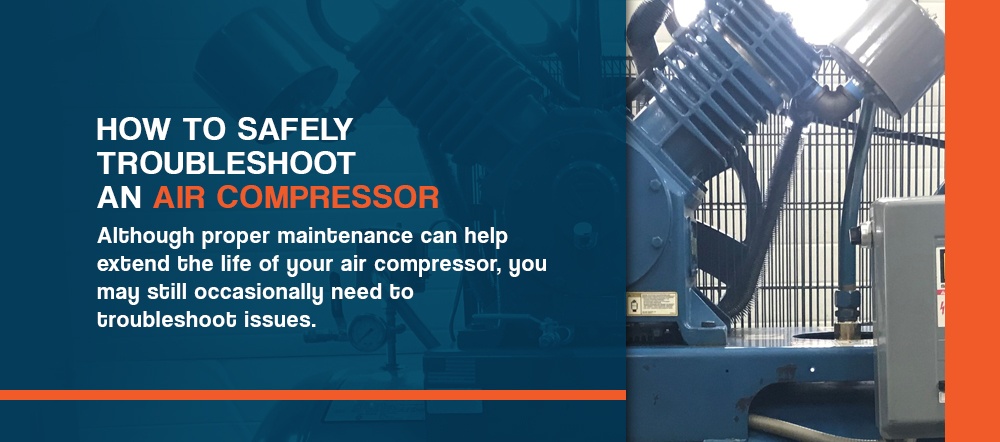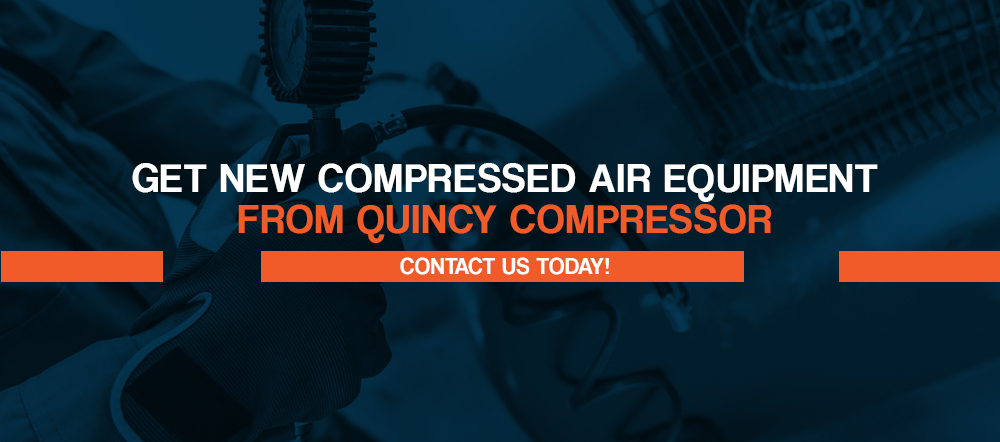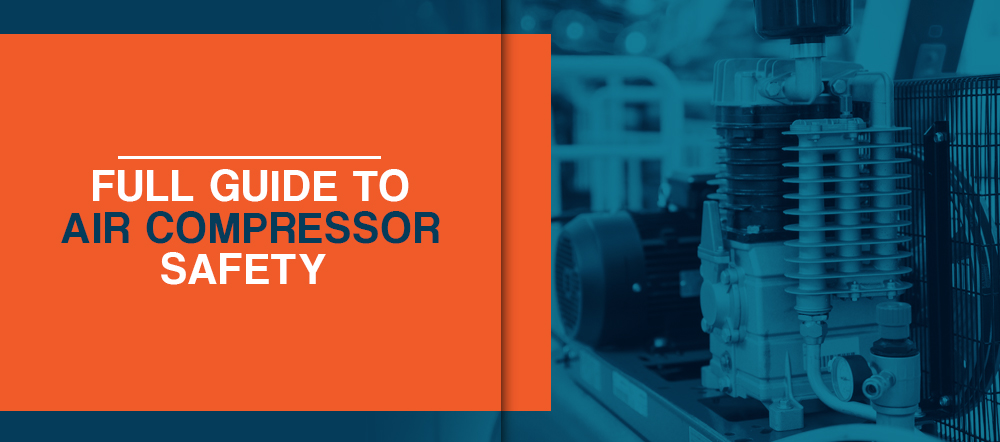
Safety should be the priority in any workplace environment, whether it’s a construction site, a factory or another setting. Business leaders want to make sure their employees are safe, maintain high morale among their workforce and reduce the possibility of damaged or broken machinery. By employing practical safety measures, your company can benefit from increased uptime and fewer repair or replacement expenses.
Having safety measures in place is especially important when working with air compressors and other high-powered machinery. You should treat compressed air with the same amount of care as other energy sources — misuse or a lack of proper precautions can present risks.
Compressed air contains intense pressure. Even brief contact with protected skin can cause cuts, abrasions and other injuries. After skin breaks, an air compressor can force air under the skin, resulting in air embolism and severe injuries like organ damage.
To avoid these risks, all operators must have thorough training in air compressor usage and possible damages. Training manuals contain detailed information about how to run compressors safely and efficiently.
This guide explores how to use an air compressor, what to inspect before use and how to keep work environments safe.
Common Uses for Air Compressors
Air compressors meet many application needs, including:
- Cleaning: You can use compressed air to blast dirt and dust off of equipment and other products during assembly or after use. You can also use an air compressor to clean assembly surfaces and other areas that produce dust.
- Painting: Many industries use air compressors in various painting applications. The auto body sector uses compressed air-powered brushes to paint vehicles.
- Pneumatic tools: You can find pneumatic tools in countless industries, from construction sites to race tracks. Air compressors power these tools, letting them provide consistent air streams.
- Transportation: Pneumatic tubes can move small and large products, from massive vehicles to palletized items.
- Production services: Pneumatic systems can power conveyer belts, clamps and other production items. Manufacturing services can find air-powered components to meet their exact product needs.
- Food and beverage processing: Food and beverage companies apply compressed air during filling and capping procedures for food and drinks. Compressed air can also assist during fermentation.
- Injection molding: Compressed air is an integral component in injection molding processes during plastic production.
Common Air Compressor Hazards
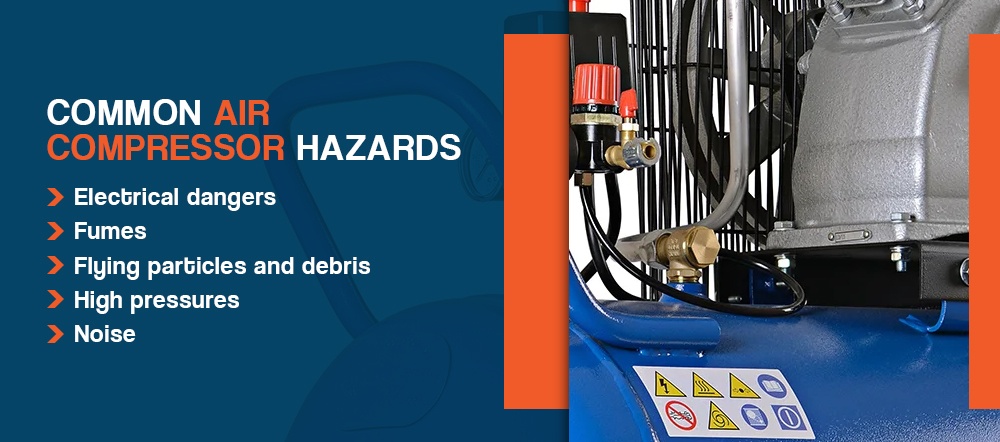
Air compressors are useful for many jobs, but they can also become dangerous when not maintained properly or misused. Compressor machines, hoses, pneumatic tools and electric connections can all pose hazards in the workplace. Air compressor accidents could potentially cause harm to workers and machinery.
These are a few common compressed air hazards:
- Electrical dangers: Incorrect outlet grounding can result in electrical shocks for your operators or irreparable damage to the machine. Follow the instructions in the owner’s manual for extension cord use and other safety information about electrical hazards.
- Fumes: Gas-powered and diesel-powered compressors produce dangerous fumes, so it’s important that you only use them outside.
- Flying particles and debris: Highly pressurized air and pneumatic tools can cause flying debris. If it strikes an operator, the pieces can cause bodily injury, or they can become lodged in the machine, causing damage.
- High pressures: High-pressure air can cause many dangerous conditions and injuries if injected into the body, including ruptured eardrums or organs.
- Noise: Another compressed air hazard is noise. Loud sounds from the compressor machine can cause hearing loss.
Operators and workers can mitigate these dangers and compressed air injury by following proper safety measures and air compressor precautions, which we will discuss later in the guide.
Some common questions related to air compressor safety include the following:
Is It Safe to Breathe Air From a Compressor?
Depending on your work environment, the air can contain harmful pollutants and contaminants. From carbon monoxide to dust and debris, the air in the compressor collects everything from the surrounding space. Workers can stay safe by working in areas with proper airflow, which prevents excessive buildup of contaminants. You should also wear protective gear like respirators and dust masks to shield your body from pollutants.
Can an Air Compressor Kill You?
While the likelihood of a workplace fatality due to an air compressor failure is low, it can happen in some extreme circumstances. If a compressor tank explodes, it can endanger your workers’ lives, but typically, the highest amount of danger lies with the operator. Due to the high pressures and pneumatic tools attached, operators must abide by all safety rules and regulations, including having the proper protective gear.
Air Compressor Safety Tips
Every operator needs to undergo proper training and learn the relevant safety standards before using an air compressor. If you upgrade your air compressors or make any repairs, it’s essential to update operators on any changes so they know how to use the machine correctly and know what to look out for. It’s also important to check air compressor safety regulations from the Occupational Safety and Health Administration (OSHA) and ensure you comply with any that apply to your uses or machines.
Equipment and Workspace Setup Safety Tips
The way your equipment and workspace are set up can have a significant impact on safety. Some air compressor and workspace setup tips to keep in mind include:
- Component pressure ratings: Make sure that all components, including hoses, pipes and fittings, are rated for the maximum pressure of the air compressor.
- Relief valves: Relief valves automatically release air if the pressure in the tank gets too high. These valves are important air compressor tank safety features, so you should never attempt to adjust, bypass or remove them.
- Drain valves: If your compressor has an electric drain valve, make sure it is at least a foot and a half above the ground. Electric drain valves must be kept away from moisture.
- Shutoff valve: The shutoff valve should always be visible and within reach when working with compressed air.
- Guards for moving parts: Ensure that all moving parts, such as flywheels, belts and pulleys, are effectively guarded.
- Workspace air circulation: Intake air contains pollutants and carbon monoxide that can be hazardous to your health. For these reasons and others, it’s essential to keep your workspace circulated with clean air at all times.
- Workspace humidity: It’s important to keep the humidity in your workspace from getting too high. To decrease the moisture in the air, try increasing air circulation in the workspace, operating your compressor for longer periods, using a peripheral crankcase heater or adding a dryer to your compressed air system.
Pre-Operation Checks
Before using a compressor, you need to check various components to make sure the machine can function correctly. To keep track of any issues and ensure you’ve looked at all the necessary areas, create an air compressor safety checklist for your operators to complete before each job. Some of the elements you may want to look at include:
- Oil level: It’s essential to check and see if the machine has an appropriate amount of oil. Using it without an adequate amount of oil can ruin it to the point of requiring costly repairs or replacement. If it needs more oil, add oil to the reservoir but be careful not to overfill it. Also, be sure to keep oil from spilling onto the exterior of the compressor.
- Lubrication: Properly apply the recommended lubricants to every pneumatic tool to increase operational efficiency. Verify that lubricants are not flammable before using them.
- Fuel level: Air compressors require sufficient fuel amounts to run efficiently. Operators should refuel before using the machine. Refilling in the middle of a job adds excess time to the project — you have to let the compressor cool off before refilling the tank. It can be dangerous to refuel air compressors when they’re still hot. Instead, refuel only when the machine is cold.
- Air filter: Whether you use a given compressor every day or only every once in a while, check the air filter before use. If it appears dirty or clogged, you should remove and wash it — if you have the right kind of screen — or replace it with a new filter.
- Air connection: Before turning on your air compressor, make sure that it is securely connected to the air source. If the connection is weak or loose, the compressor may not perform as expected, and parts could disconnect, potentially leading to injury.
- Outlets: Ensure your air compressor is only used with outlets that have the proper grounding. If you plug an air compressor into an incorrectly grounded outlet, it could damage the machine’s electrical circuitry and even cause a fire.
- Tools: Make sure that any tools you have hooked to the air compressors don’t have pulled triggers before you power up the machine.
There are also air compressor safety tips and procedures for particular parts of the compressor. Three of these components include pressure regulation devices, air receivers and distribution lines. Each of these is significant in maintaining a healthy machine and operating it safely.
Pressure Regulation Devices
Pressure regulation devices control airflow, ensuring the proper amount of pressure is released. Before managing these devices, check these components:
- Valves: Ensure that the safety valves on your air tank are set to at least 10% or 15 psi — whichever is greater — above the operating pressure of the compressor but never higher than the air receiver’s working pressure limit. If using an air compressor in freezing temperatures, check that the safety valves are positioned in a way that prevents water from collecting inside the unit. If a valve freezes, thaw it and empty the compressor tank before reactivating the unit. The machine should also have shielded blowoff valves so sudden blowoffs don’t result in equipment damage or injury.
- Air intake: The air intake should receive air only from clean, outdoor sources. Place a filter or screen at the intake valve to keep the intake air clean.
- Speed: Check the manual that came with your compressor for the maximum recommended speed and ensure that you never run your compressor at speeds exceeding this level.
Air Receivers
Air receivers store compressed air before it enters piping equipment. Operators should inspect these parts before using them:
- Drain: If your air compressor doesn’t have an automatic drain, be sure to drain the air receiver regularly so liquid does not build up inside of it.
- Gauges and valves: Ensure that your air receiver has a pressure gauge and a safety valve that meets the American Society of Mechanical Engineers (ASME) standards.
- Release: Air receivers should include a spring-loaded release valve to prevent the working pressure from exceeding the recommended maximum.
Distribution Lines
Distribution lines are essential for safe operation, connecting disparate parts. Make sure these components are working properly by checking out:
- Air hoses: Don’t let air hoses become bent or kinked. Check distribution lines regularly for flaws, damage and imperfections and replace any defective air lines immediately.
- Fittings: Only use secure standard fittings on air lines.
- Tags: Place tags on each air line that indicate its maximum working pressure to help operators avoid exceeding these limits.
General Operator Safety
Operators should also take certain precautions while operating air compressors and after completing a project using an air compressor. It’s essential to remain in control of compressor units at all times. Keep your air compressor in a visible area so it can be constantly supervised and maintained. Sound footing and standing on a level surface at a safe distance from the unit is crucial as is keeping your hands, clothing and hair away from the air nozzle and tools.
While you can use compressed air for cleaning certain objects at low pressures and with a nozzle, you should never use compressed air for cleaning clothing or human skin. Don’t use compressed air to pressurize a vessel, such as to empty oil from a gearbox, as these vessels aren’t designed to handle high pressures. Don’t dry bearings using compressed air, as doing so can cause excessive rotation speeds that can cause bearings to explode.
All workers should be fully versed in equipment safety and techniques to reduce potential injuries or accidents on the job. Create an open-door policy where employees feel comfortable making suggestions or asking questions about the equipment.
Also, be sure to wear the proper safety gear for the job. No matter what tool you’re using for a given project, it’s vital to wear protective gear for your ears and eyes at all times. According to the Centers for Disease Control and Prevention (CDC), an estimated 22 million workers face exposure to potentially harmful noise every year. The risks involved with failing to wear hearing guards might not always be apparent at first, but adverse effects due to noise exposure are often experienced later — in some cases, years down the line.
Personal protective equipment (PPE) to consider includes goggles, face masks, rubber or leather gloves, steel-toed shoes and leather or PVC aprons. Cotton clothing is not an effective barrier to compressed air. Cover any part of the body that is at risk of coming into contact with compressed air or flying particles.
To prevent safety issues, it’s crucial to keep an eye out for any potential issues while you’re using an air compressor. Once you start the machine and begin your work, be sure to check the following items consistently:
- Surroundings: In addition to managing your own safety, keep an eye out for other workers and ensure you’re keeping the surrounding area safe. Make sure that all your hoses, cables and wires are tucked away where no one can trip on them and that you keep your area clean.
- Voltage: Pay close attention to your air compressor’s voltage. If repairs are needed, power down the machine, lock and tag out all power sources and release all pressure from the compressor. If your compressor is designed for indoor use, don’t use it outdoors, as rain or wet conditions can cause electrical problems.
- Air source: Be sure to check the air source itself regularly to ensure optimal performance and efficiency. The air source should be clean and dry. You can use screens or filters to clean the incoming air.
- Air inlet: At the inlet, the air that goes in should be clean and free of moisture and should not exceed the maximum recommended pressure. If the maximum pressure rating of a particular tool is surpassed, it could cause various dangers, such as cracks, undue velocity or faulty pressure or output torque.
Safety Tips for Cleaning and Maintaining an Air Compressor
Performing preventative maintenance is essential to keeping your compressor running smoothly and safely. It can increase the longevity of your machine and improve its capabilities. Running a clean, well-kept machine will also promote the well-being of your workers and operators and help manage air compressor risks.
Below are some tips on how to safely clean an air compressor and perform any required maintenance work:
- Receive the proper training: Anyone performing maintenance on an air compressor should have received the appropriate training to ensure they conduct maintenance tasks correctly and safely.
- Follow the manufacturer’s recommendations: To ensure safety in maintenance and operation, it’s important to follow the care and maintenance recommendations of your compressor’s manufacturer.
- Disconnect power: Before performing maintenance work, shut off the machine and disconnect it from all power sources. Lock open the electrical switch for the compressor and tag it so no one starts it by mistake.
- Clean the unit properly: Cleaning your air compressor regularly will improve its performance and extend its life. When it comes to cleaning carbon remnants from the various parts of an air compressor, it’s safe to use soapy water or a lye solution, but you should never use anything flammable, such as kerosene. Following every cleaning, completely purge the air system.
- Lubricate properly: Don’t use oils with low flash points to lubricate compressor parts. These oils could combust due to the high temperatures produced by air compressors during operation. It’s essential, however, to keep parts lubricated with the proper oils and to avoid over-lubrication to prevent corrosion.
- Take steps to prevent rust: One of the most dangerous possibilities when it comes to air compressors is a rusty tank. Rust increases the unit’s chances of combusting, putting anyone nearby in danger. To prevent rust due to the accumulation of liquid, use the underside valve to drain the tank daily. If a tank becomes rusted, don’t attempt to repair it. A rusted tank requires replacement.
- Handle tools safely: Before you install, remove, fine-tune or perform any kind of maintenance on your pneumatic impact tools or accessory parts, shut off the source of air, bleed the air pressure and disengage the air hose.
- Report faulty equipment immediately: If you notice that repair work is needed that goes beyond regular maintenance, tag out the machine so no one uses it. Then, report the issue as quickly as possible so the machine can be repaired.
How to Safely Troubleshoot an Air Compressor
Although proper maintenance can help extend the life of your air compressor, you may still occasionally need to troubleshoot issues. Follow these compressed air safety tips when troubleshooting your equipment:
- Shut down your compressor: Turn off your compressor, disconnect it from power and bleed any remaining air pressure before doing any troubleshooting or repair work. Make sure that the shutoff valve is always within reach in case something goes wrong during operation.
- Follow safety procedures for hose malfunctions: If a hose malfunctions or comes apart at the coupling, you can prevent whipping with two components. One is an air fuse of the proper size, which you should install in the hose upstream. The other is a whip-inhibiting device that is placed along the coupling of a hose. If an air hose does start whipping around uncontrollably or another similar air hose problem occurs, don’t try to stop and control it by grabbing the hose. To prevent injury, turn off the air source before touching the hose.
- Use reliable parts: If a component becomes damaged or needs to be replaced for any reason, use only reliable, high-quality parts that are the correct size, material and type for your machine. Using the wrong parts or low-quality components can result in decreased compressor performance, damage to your equipment and safety hazards.
Buying an Air Compressor
If you need a new air compressor, you might feel tempted to purchase a remanufactured or secondhand air compressor system. However, these systems might not provide efficient or consistent performance. Higher-quality compressors might cost more, but they are entirely safe to use and have minimal downtime.
Name-brand compressors also provide access to service providers that can offer expert maintenance advice. They can instruct you on safety measures to employ while using the tools.
Get New Compressed Air Equipment From Quincy Compressor
As one of the world’s leading sellers of compressed air products for nearly 100 years, Quincy Compressor offers an array of machines and parts for many industries. With our one-of-a-kind offers and round-the-clock support, we’ve supplied and serviced businesses in the automotive, manufacturing and construction sectors, among others.
People have various uses for compressed air, and at Quincy, we’ve got them all covered. With Quincy, there’s no application too demanding for our top-of-the-line products to handle with utmost ease and maximum efficiency. Everyone who shops with us receives support from our authorized partners, day or night, as well as industry-leading warranties on select compressor products.
If you’re in the market for compressed air devices or related equipment, explore our website, where you can download whitepapers for more information on our wide range of products. You can also contact your local authorized Quincy Compressor distributor for air compressor sales and service in your area.
Contact Us Learn More Find a Dealer Near You
Last Updated on June 28, 2023 at 11:30 am

